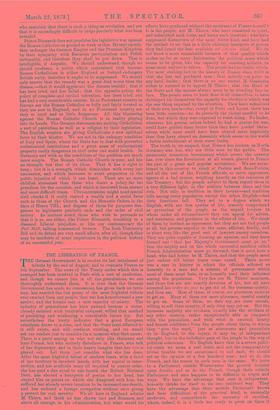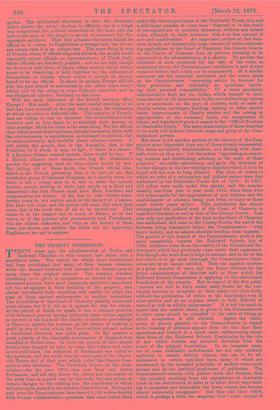THE LIBERATION OF FRANCE.
THE German Government is to receive its last instalment of tribute by the end of August, and to evacuate France on 5th September. The news of the Treaty under which this is arranged has been received in Paris with a sort of exultation, and though we cannot join in all the gratulations, we can thoroughly understand them. It is true that the German Government has made no concessions, has given back no terri- tory, has exacted the last penny of the most frightful tribute ever exacted from any people, that war has henceforward a new motive, and the human race a new capacity of misery. The industry of generations has been pawned because a victor, already satiated with territorial conquest, willed that method of punishing and weakening a conceivable future foe. But nevertheless the treaty indicates that a great European cataclysm draws to a close, and that the State most affected by it still exists, and will continue existing, and we would ask our readers just to consider for a moment what that means. There is a party among us who not only like Germany and hate France, but who entirely disbelieve in France, who talk of her degeneracy, and in their hearts imagine that her role is played out. Let them just consider what she has done. After the most frightful defeat of modern times, with a third of her territory in invaders' hands, with her capital in insur- rection, and her available army all required to restore order. she has paid a fine equal to one fourth the British National Debt, has elected a bourgeois of genius to her head, has obeyed him on points on which she disagreed with him, has suffered her already severe taxation to be increased one-fourth, and has endured a foreign occupation without once giving a pretext for real severity. We all here in England admire M. Thiers, and think he has shown tact and firmness, and above all courage, in his administration, but what would his efforts have produced without the assistance of France herself ? It is the people, not M. Thiers, who have remained so quiet, and subscribed such loans, and borne such taxation ; who have suppressed discontents of the most bitter kind, and have had the instinct to see that in a little chirrupy bourgeois of genius they had found the beet available Sul interim chief. We do not know a more remarkable instance of that quality which makes up for so many deficiencies, the political sense which seems to be given, like the capacity for resisting malaria, to some races, and not to others. The people had no visible chiefs. The most striking fact in the history of France since 1870 is that she has not produced men ; that nobody can point to any local leader ; that there is no one except M. Gambetta either to succeed or to oppose M. Thiers ; that the Head of the State and the masses always seem to be standing face to face. The people seem to have done it all themselves, to have developed for themselves the capacity for obedience which was the one thing required by the situation. They have submitted of their own heads—for, except in Paris and Lyons, there has been little coercion—to do precisely the things needful to be done, but which they were expected to resist doing. No leader, whatever his genius, unless indeed he had a genius for war, could have guided them better than they have guided them- selves, while none could have been obeyed more implicitly than they have obeyed an Assembly which seems to the world a feeble embodiment of their worst faults.
The truth is, we suspect, that France has leaders, as North Germany also has, who are little seen by the public. The immensely numerous bureaucracy which covers the country has, ever since the Revolution at all events, played in France the part of a great and popular aristocracy. We are accus- tomed in this country to think of Prefets and Sous-Prefets, and all the rest of the French officials, as mere oppressors, agents of a bad system, weighing heavily on the resources of the Treasury ; but the people subject to them regard them in a very different light, as the arbiters between them and the rich. Not only is tradition in their favour—and tradition tells among every population except the urban English—but their functions tell. They act to a degree which we English, with our free system of life, scarcely comprehend as protectors of the people, as the unpaid lawyers to whom under all circumstances they can appeal for advice, and assistance, and guidance in the affairs of life. We think of them by instinct as oppressors, but they are not bad people at all, but persons superior to the mass, efficient, kindly, and in short very like the good sort of lawyers among ourselves. They are quite capable of forming an opinion, and they have formed one "that her Majesty's Government must go on," that the mighty and on the whole successful machine called French Administration mast go forward, that it must have a head, who had better be M. Thiers, and that the people must just endure till better times come round. There never was a case in history in which the officials adhered so honestly to a man and a scheme of government which most of them must hate, or so honestly used their influence among the population. Very few are M. Thiers' nominees, and those few are not exactly devotees of his, but all have accepted his ordre du jour to get rid of the Germans quietly, and then see. Most of them, of course, are placemen, anxious to get on. Many of them are mere placemen, careful mainly to get on. Some of them, we dare say, are mere rascals, willing to sell their country, if only they may get on. But the immense majority are civilians, exactly like the civilians of any other country, rather exceptionally able as compared with the population, and with what is unusual, hearty and honest confidence from the people about them, to whom they " give the word," just as aristocrats and journalists do in England, to the injury, it may be, of independent. thought, but to the indefinite gain of the people in the way of political coherence. We English know that in a severe politi- cal crisis, we mean a real crisis, and not the comparatively trivial trouble we are accustomed to call such, we should act on the opinion of a few hundred men ; and so do the French, and the reason in each case is the same. We leave to a Parliament outside Westminster the general decision upon details, and so do the French, though their outside Parliament and ours happens to be different in origin and ways. We have the advantage that ours is independent, honestly thinks for itself in its own unideaed way. They have the advantage that their outside Parliament knows and feels difficulties of the practical kind, is unusually moderate, and comprehends the necessity of sacrifice, which, indeed, it is a little too ready to press on those it guides. The intellectual electorate, in fact, the electorate which directs the actual electors, is efficient, can in a rough way comprehend the political necessities of the hour, and can induce the mass of the people to accede to necessary but dis- agreeable sacrifices. That this ultimate electorate should be official is, of course, to Englishmen a strange fact, but we are not certain that it is an unique one. The same thing is true of Prussia, where, if official etiquette allowed, the people would constantly return officials as representatives ; of North Italy, where officials are distinctly popular ; and we are told, though we do not so well know, of Spain, where society, which always seems to be dissolving, is held together by the influence of Committees or Juntas, whose centre is always on inquiry found to be an official. In short, in modern Europe officials play the part played by aristocrats in the olden times every- where, and by the clergy in some Catholic countries, and in one Protestant country, Scotland, to this hour.
Will the early liberation of the French territory affect Europe ? Not much. After the most careful watching of all that has been revealed in the past three years, the conclusion at which we arrive is definitely this. The majority of French- men are willing to ran an immense risk to revindicate their territory and as they think to re-establish their honour or their prestige, which for them is the same thing. But the official class, which acts as their fugleman, though honourably bitter with the circumstances, is nevertheless accustomed to politics, able to endure adversity, and doubtful about extreme courses. It will advise the people, that is the Assembly, that is the President, be it whom it may, to fight, if there is a chance. If a Russian alliance seemed certain, there would be war. If a British alliance were certain—we beg Mr. Gladstone's pardon for suggesting such an idea—there would be war. But failing aid of those kinds, the French official idea, which is the French governing idea, is to wait, to see this wonderful group of Germans disappear, as it shortly must, for there is not a young man in it, and to make the quarrel historic, merely settling in their own minds as a fixed and immovable idea that France must have Metz, Lorraine, and compensation for Alsace. If she has to wait twenty years, twenty years do not matter much in the history of a nation. The hour will come, and the genius will come, and when they .come, that is the work first of all to be carried out. That seems to us the temper not so much of France, or of her rulers, as of the persons who permanently lead Frenchmen, who are almost unknown, and who, as the history of three years has shown, are neither the idiots nor the oppressors Englishmen are apt to suppose.



































 Previous page
Previous page